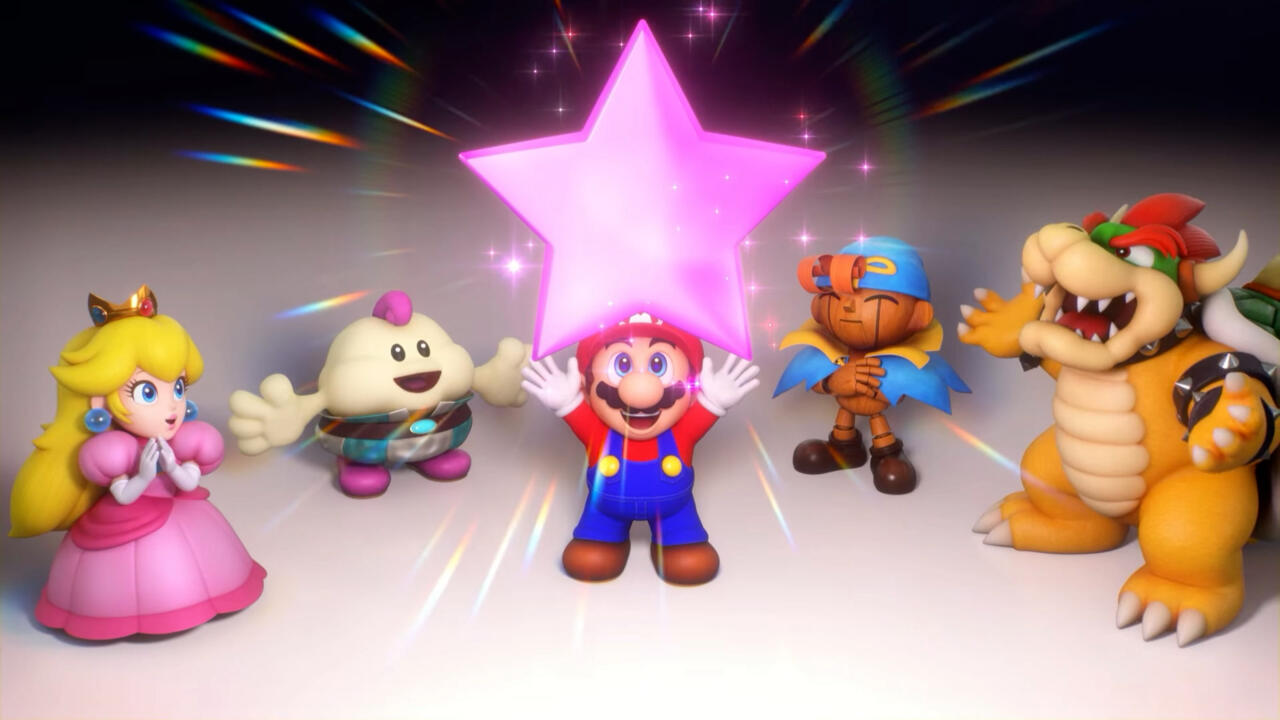Don't miss our holiday offer - 20% OFF!
Best Of 2023: Super Mario RPG’s Level-Up Screen Proves ArtePiazza Understood The Assignment
Super Mario RPG: Legend Of The Seven Stars is one of my favorite games of all time. I’ve played it once a year for over a decade, and as such I am very familiar with this offbeat take on the Mario universe. I loved the characters, I loved the battle system–my first foray into turn-based RPGs, in fact–and I loved the idea of expanding on a franchise I’d been visiting since I was three years old. Before SMRPG, the Mushroom Kingdom and its surroundings was a collection of flat worlds where I’d move from left to right. This time, however, it actually felt like a kingdom, with towns and cities populated by people to speak with, not just enemies to jump on.
On June 21 of this year, Nintendo made the announcement I’d waited on for 27 years: Super Mario RPG was coming back, rebuilt from the ground up with new visuals, new mechanics, and a revamped soundtrack by the original composer. My initial reaction was my brain melting out of my ears coupled with actual tears of joy, but once I settled down and really started to process this news, that joy gave way to a small bit of anxiety: What if the game’s personality gets lost in restoration?

Part of what endears me and many other players to Super Mario RPG is just how silly the whole thing is. It revels in physical comedy, like Mario’s pantomimed retelling of events to the Mushroom Kingdom’s Chancellor. Characters and bosses are inherently weird, from the affable idiot Booster to a battle against a literal two-tiered wedding cake where each tier is a separate enemy. Some of the jokes and puns are dated–show of hands for those who know what the giant knife named Mack was referencing. The mountain of obstacles looked to be the size of Everest; would this remake make it to the summit?
In the early going, things seemed no worse for wear. The beginning sequence with Bowser on the chandeliers retained his vocal barbs, the Mario pantomime remained untouched, and Mack’s name was changed to Claymorton–a clever sword-based pun. Not bad, but I still wasn’t convinced…that is, until I saw, of all things, the level-up screen.
In the original game, this screen was simple: The character leveling up would appear out of a pipe, the screen would show their stat boosts, I’d get the option to choose a second boost to either HP, physical attack/defense, or magic attack/defense, and then the game would proceed. In the beginning of this new version, when only Mario was in my party, the screen was basically the same, only Mario appeared on a lit theater stage with a lot of empty space around him on the screen. Odd choice, I thought, but I didn’t dwell on it. Then, after a bit, Mallow joins the party, and the first time Mario leveled up after he arrived, any lasting worry I might have had about this remake left my mind. All it took, it turns out, was a little dancing.
Best Of 2023: Super Mario RPG Level Up Screen
Please use a html5 video capable browser to watch videos.
This video has an invalid file format.
Sorry, but you can’t access this content!
Please enter your date of birth to view this video
By clicking ‘enter’, you agree to GameSpot’s
Terms of Use and Privacy Policy
Now, any time I leveled up a character, the rest of the group would celebrate by boogieing down. Mario would do a little sidestep, Mallow would swing his fists wildly with a look of pure joy, Geno would shimmy his cape, Peach would sway her arms around, heck even Bowser would stomp to the rhythm. Leveling up always made me happy in this game, but now that smile was extra wide thanks to the impromptu dance party that awaited me every time.
The first time I saw that celebration, when it was just Mario and Mallow in the early part of the adventure, solidified to me that ArtePiazza–the studio behind this remake–understood the full gravity of the project it’d undertaken. The team’s RPG credits speak for themselves, as the studio is credited with multiple Dragon Quest and SaGa games, but what made Super Mario RPG great wasn’t so much its mechanics as it was its personality. The battle system could be tuned to perfection, but without the tone, it would fall flat.
Here, with this level-up screen, ArtePiazza showed that not only did it know what SMRPG fans like me wanted from this remake, but it knew how to make new ideas fit into that scheme too. These level-up festivities are a brand-new addition, with nothing from the previous games to pull from, and yet it feels like the characters were always dancing in celebration of their friends getting better; we just couldn’t see it before.
There are many instances throughout the game where ArtePiazza shows its understanding for what Super Mario RPG was trying to do in 1996, but none are more apparent than when the team gets together to boogie down while one of their own powers up. If this is the kind of idea the studio thinks up for a remake, I can only imagine what it’d pour into a potential sequel. If that happens, I’ll be dancing too.

